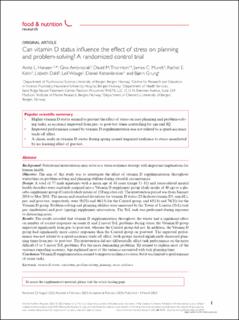Can vitamin D status influence the effect of stress on planning and problem-solving? A randomized control trial
Hansen, Anita Lill; Ambroziak, Gina; Thornton, David Malcolm; Mundt, James C.; Kahn, Rachel E.; Dahl, Lisbeth; Waage, Leif; Kattenbraker, Daniel; Grung, Bjørn
Journal article, Peer reviewed
Published version

Åpne
Permanent lenke
https://hdl.handle.net/11250/3108654Utgivelsesdato
2023Metadata
Vis full innførselSamlinger
Sammendrag
Background: Nutritional interventions may serve as a stress resilience strategy with important implications for human health.
Objective: The aim of this study was to investigate the effect of vitamin D supplementation throughout wintertime on problem-solving and planning abilities during stressful circumstances.
Design: A total of 77 male inpatients with a mean age of 48 years (range 31–81) and stress-related mental health disorders were randomly assigned into a Vitamin D supplement group (daily intake of 40 μg) or a placebo supplement group (Control) (daily intake of 120 mg olive oil). The intervention period was from January 2018 to May 2018. The means and standard deviations for vitamin D status (25-hydroxyvitamin D3, nmol/L), pre- and post-test, respectively, were 58(21) and 46(15) for the Control group, and 63(18) and 76(21) for the Vitamin D group. Problem-solving and planning abilities were measured by the Tower of London (ToL) task pre- (midwinter) and post- (spring) supplement intervention. The ToL task was performed during exposure to distracting noise.
Results: The results revealed that vitamin D supplementation throughout the winter had a significant effect on number of correct responses on easier (1 and 2 move) ToL problems during stress; the Vitamin D group improved significantly from pre- to post-test, whereas the Control group did not. In addition, the Vitamin D group had significantly more correct responses than the Control group on post-test. The improved performance was not related to a speed-accuracy trade off effect; both groups showed significantly decreased planning times from pre- to post-test. The intervention did not differentially affect task performance on the more difficult (3 to 5 move) ToL problems. For the more demanding problems, IQ seemed to explain most of the variance regarding accuracy. Age explained most of the variance associated with task planning time.
Conclusion: Vitamin D supplementation seemed to improve resilience to stress, but it was limited to performance of easier tasks.
